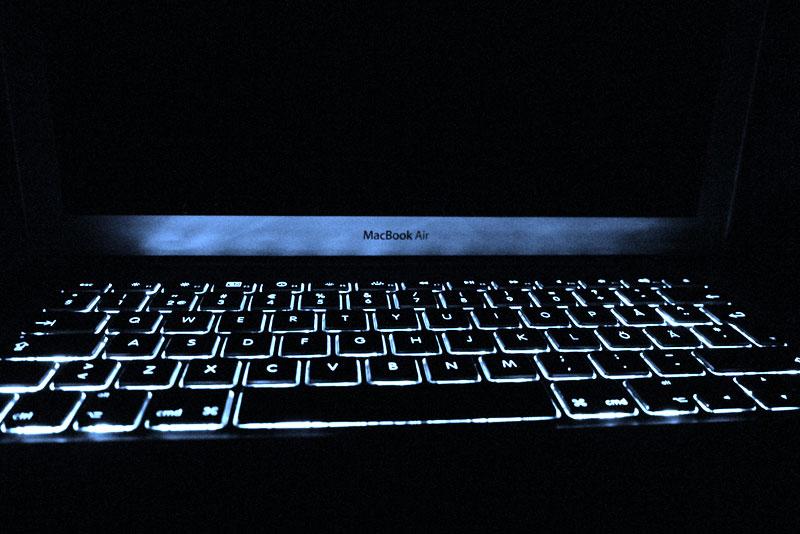Apple's new MacBook Airs to bring back backlit keyboards - sources
According to people familiar with the matter, backlit keyboards will join the string of hardware enhancements planned for the new 11.6- and 13.3-inch notebooks, which are also expected to adopt high-speed Thunderbolt ports, an upgrade to Intel's Sandy Bridge architecture, and possibly high-speed 400MBps flash memory.
The omission late last year of keyboard backlights — which help illuminate the keys on a keyboard in dim lighting scenarios — from Apple's current lineup of MacBook Airs was particularly glaring given that all three iterations of the first-generation of MacBook Airs (Early 2008 to Mid-2009) included them as standard features.
Given Apple's energy saving controls, software expertise, and the nominal cost associated with including keyboard backlights, it was never particularly clear why Apple opted to leave out the feature when it redesigned the MacBook Air line last October. One industry watcher even went as far as to call it "planned obsolescence" on Apple's part.
Nevertheless, people familiar with the matter say Apple's white 13.3-inch MacBook will once again be the only notebook from the company to lack keyboard backlights once the new Airs make their debut sometime during the week of July 21st.
As AppleInsider reported a month ago, Apple has been holding off shipments of roughly 400,000 of these new MacBook Airs until it can image them with the finalized Golden Master build of Mac OS X Lion, which privately began making its way to developers last week.
As for Lion's release to the public, AppleInsider indicated last week that preparatory measures were put in motion for an unveiling this week. However, there have been some underground rumors of last minute security issues related to application resumes and restarts that could possible delay the update till next week. At the same time, buzz from within Apple's home base has also suggested this Friday as a possibility. But given that Apple just began accepting applications for Lion to the Mac App Store a few hours ago, that may suddenly seem ambitious.
MacBook Air's long-lost backlit keyboard, as pictured on a 1st-gen model | Credit: zanoii's flickr
Either way, Friday releases of major OS X upgrades have been somewhat of a tradition for Apple for nearly a decade. With the exception of Cheetah and Puma, which were released on a Tuesday and Saturday, respectively, back in 2001, all major new versions of OS X have made their debut on a Friday: Panther (Friday, Oct. 24, 2003), Tiger (Friday, Apr. 29, 2005), Leopard (Friday, Oct. 26, 2007), and Snow Leopard (Friday, Aug. 28, 2009).
Since their introduction last October, the aggressively-priced 11.6- and 13.3-inch MacBook Airs (Review) have been a runaway success, with Apple assembling roughly 1 million units within their first quarter of availability. During those three months, consumers reportedly chose the new MacBook Airs at a one-to-two ratio to the company's more established MacBook Pro offerings, making for one of the company's most successful Mac product launches ever.
And while rivals like Intel continue in their attempts to race to market with 'Ultrabook' designs to take on the Air, analysts like Deutsche Bank's Chris Whitmore see the upcoming generation of Lion-equipped Airs boosting sales by some 50%, or to 1.5 million units per quarter.
Should this month's introductions boost Air sales by the margin Whitmore predicts, the MacBook Air line will have in just under a year grown to account for nearly half of all the notebooks Apple ships in a single quarter, further fortifying their design as a harbinger of things to come across the remainder of the company's portable Mac offerings.
 Kasper Jade
Kasper Jade











 Mike Wuerthele
Mike Wuerthele

 Malcolm Owen
Malcolm Owen
 Chip Loder
Chip Loder

 William Gallagher
William Gallagher
 Christine McKee
Christine McKee
 Michael Stroup
Michael Stroup







